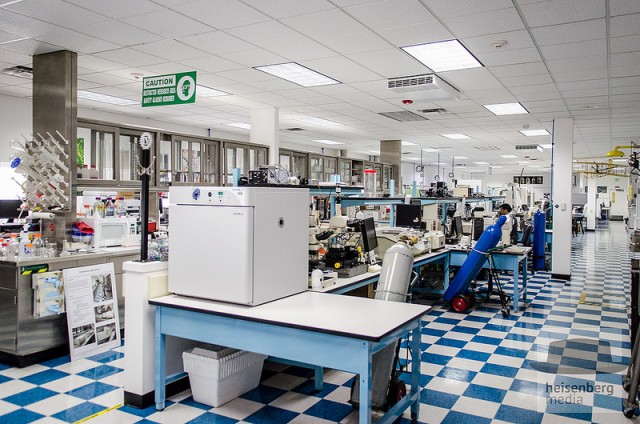Uber-troll Intellectual Ventures faces Motorola in first patent trial
Three patents, two low-profile inventors, one jury.

Intellectual Ventures' laboratory in Bellevue, Washington.
In the early stages, IV marketed itself as a kind of patent defense fund, and it got tech-sector heavyweights like Google, Apple, eBay, and Cisco to invest. Since its founding in 2000, IV is believed to have raised about $6 billion in cash, of which it has recouped about $3 billion in licensing payments.
But the strategy of IV, headed by ex-Microsoft CTO Nathan Myhrvold, changed over time. As the company began looking for giant payouts, it became the bête noire of Silicon Valley rather than an ally. A few years ago, IV started filing lawsuits. Now one of its cases, over three smartphone patents, will go to a jury—a case against Google-owned Motorola, no less, a company known for its reluctance to settle cases.
The lawsuit (PDF) against Motorola was filed back in 2011. Opening statements began on Thursday in federal court in Delaware.
"There's no building at Intellectual Ventures," said Motorola's attorney, according to a report from Reuters. "They are in the business of bringing lawsuits."
IV says that it has three patents Motorola infringes by operating, among other things, Google Play. IV's lawyers urged the jury to focus on the inventors behind the patents, including Rajendra Kumar.
"Motorola will try to tell you the man who loved to invent didn't invent anything," said an IV lawyer, referring to Kumar.
The trial is expected to last through next week. It will only address the validity and alleged infringement of IV's patents. Damages, if appropriate, will be considered in a separate proceeding.
Patent-focused inventors
While IV lawyers boast about the inventors' prowess to the jury, neither the inventors nor the company that now owns their patents are interested in talking about those inventions to anyone else. Both Kumar and Richard Reisman, who invented the two other patents at issue in this trial, wouldn't talk to reporters, leaving Reuters working with trails of previous litigation, public documents, and occasional blog posts by the inventors.Kumar's company, Khyber Technologies, is mostly focused on his patents. "My patents can be employed as a barrier to entry for such products I help create," Kumar writes on his company website.
Kumar is the named inventor on US Patent No. 7,120,462, which has a priority date of 1999 and describes a portable computer with a detachable handset.
Reisman is the inventor of patents numbered 6,658,464, on software "that controls transport, storage, and presentation of content from a remote source," as well as patent 6,557,054, a method of handling software updates.
On his own website, Reisman discusses a product called FairPay, which he claims to market through his company, TeleShuttle. Reisman's online biography suggests his patents have already been the subject of multi-million dollar payments. He writes:
[T]welve additional patents that expand that portfolio were awarded in 2000-2013. That led to patent infringement suits against Microsoft and Apple in 2004, and in 2006 these patents were sold for a down payment of $35 million. These patents are now controlled by Intellectual Ventures. His second important portfolio of patents relates to search, with six patents issued in 2005-12. This portfolio was sold in 2009 to RPX Corporation, the first defensive patent aggregator.One of the Reisman patents in this case was used to sue Microsoft and Apple in 2004. Two years later, the patents were sold for $35 million plus a cut of future licensing revenue to BTG International and the lawsuits were dropped, according to an earlier Reuters report. Patent office documents suggest both Reisman's and Kumar's patents were acquired by IV in 2011.
Neither Google nor IV would comment on the Delaware trial.
The companies are clashing in court as Congress considers reforms meant to put a damper on pure patent-licensing companies like Intellectual Ventures. IV says that it provides an important way to monetize inventors' ideas—an "invention marketplace." Google and its allies in the tech sector say companies like IV are abusing the system.
No comments:
Post a Comment